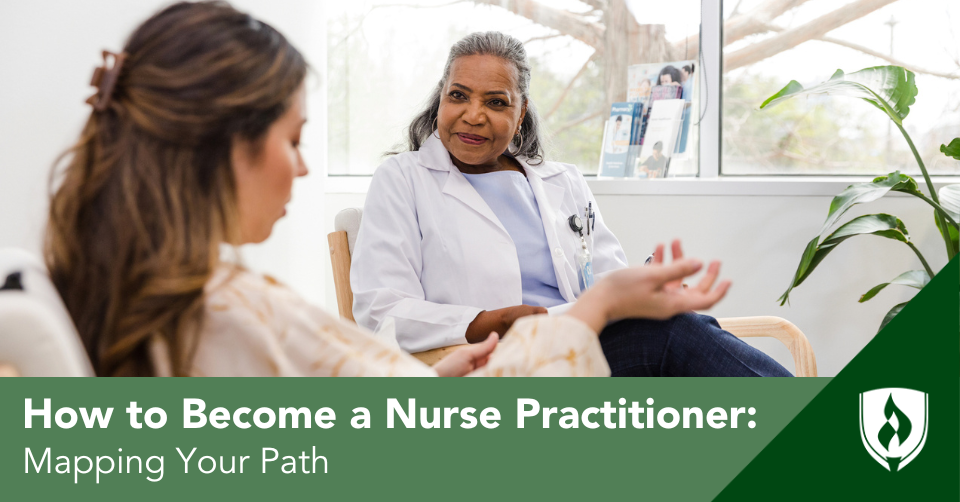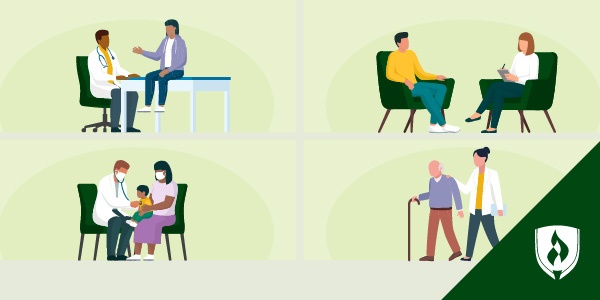
If you are an aspiring nurse or already in the field and you have a knack for complex problem-solving, the urge to provide top-notch direct patient care and a heart that beats with compassion, then becoming a nurse practitioner (NP) might just be your calling!
We will guide you through the ins and outs of becoming a nurse practitioner. From licensure requirements and salary information to mastering the art of juggling multiple tasks without dropping a single syringe, let’s inject important insight into your pursuit of advanced nursing practice.
If this sounds interesting to you, buckle up your nursing clogs, strap on your stethoscope, grab your sphygmomanometer, and get ready to dive headfirst into a world of heroic feats of multitasking and enough medical jargon to break a dictionary.
What is a nurse practitioner?
Nurse practitioners are advanced practice registered nurses (APRNs) who have completed graduate-level education and training to provide comprehensive healthcare services.
Nurse practitioners have proven clinical competency. They blend the knowledge and skills of both nurses and physicians, offering a unique and valuable approach to care that provides them with greater authority to perform more services than registered nurses (RNs).
Nurse practitioners focus on promoting wellness, preventing illness, providing acute care and managing chronic illnesses within all patient populations. They also play a crucial role in improving access to high-quality healthcare.
With their expertise, a nurse practitioner can often serve as a primary care provider, specializing in various areas such as family practice, pediatrics, geriatrics, women's health and more. Their collaborative approach, empathetic bedside manner and commitment to holistic care make nurse practitioners essential members of the healthcare team.
What do nurse practitioners do?
Nurse practitioners share the same responsibilities as an RN, like documenting a patient’s medical history and administering medicine; however, an NP's scope of practice expands much further.
A nurse practitioner's chief responsibilities encompass a diverse range of healthcare tasks, including:
- Taking comprehensive medical histories and documenting symptoms
- Conducting physical exams to evaluate patients' health status
- Ordering and interpreting diagnostic tests, such as laboratory tests or imaging scans
- Analyzing test results to form accurate diagnoses and make informed treatment decisions
- Treating and managing various illnesses, diseases and health conditions
- Developing treatment plans to address specific needs and goals
- Prescribing medications and monitoring their effectiveness and potential side effects
- Referring patients to specialized healthcare providers when necessary for further evaluation or treatment
- Providing patient education and counseling on preventive measures, health promotion, lifestyle modifications, and overall wellness to promote healthy habits and disease prevention
These multifaceted responsibilities highlight the integral role that nurse practitioners play in delivering comprehensive and patient-centered care
6 reasons why you should become a nurse practitioner
Aside from the fame and glory you'll find at your local grocer, there are a slew of compelling reasons to pursue a career as a nurse practitioner. U.S. News & World Report rated the nurse practitioner role number one in their Best Health Care Jobs ranking and number two overall, in their 100 Best Jobs ranking.1,2
Here are 6 significant reasons why you should consider pursuing a career as an NP:
1. Make a meaningful impact
As a nurse practitioner, you can make a significant difference in the lives of many patients. By providing holistic comprehensive care, diagnosing illnesses, and managing health conditions, you can improve health outcomes and enhance the overall well-being of individuals, their families and communities.
2. Broad scope of practice
Nurse practitioners have a wide scope of practice, allowing them to treat patients throughout their lifespan and in various healthcare settings. This flexibility enables NPs to explore different specialties, tailoring their careers to their passions and interests.
3. Autonomy and collaboration
NPs enjoy a unique balance of autonomy and collaboration. While they can practice independently, they also work collaboratively with other healthcare professionals to provide comprehensive and coordinated care. This teamwork fosters a supportive and enriching work environment.
4. Fulfilling career growth
The field of nursing is dynamic and constantly evolving. As an NP, you can pursue continuous professional growth and development through advanced certifications, specialized training and leadership opportunities. This opens doors to advancement, expanded responsibilities and the chance to shape the future of healthcare.
5. Projected high demand and job opportunities4
The demand for nurse practitioners continues to grow, driven by factors such as an aging population, a nationwide doctor shortage, healthcare reform and an increased focus on preventive care.6 According to the Bureau of Labor Statistics (BLS), jobs for nurse practitioners, nurse anesthetists and nurse midwives are projected to increase by 40% from 2021-2031.4 That projected growth rate is faster than the 5% projected growth rate for all occupations.4
6. Work-Life Balance
Nurse practitioners often have more control over their schedules compared to other healthcare professionals. This flexibility allows for a better work-life balance, enabling you to pursue personal interests, spend time with loved ones and prioritize self-care.
Ultimately, becoming a nurse practitioner could offer you a fulfilling and impactful career path that combines clinical expertise, patient advocacy and a lifelong commitment to improving healthcare outcomes. It is a profession that empowers you to make a real difference while providing opportunities for personal and professional growth.
How to become a nurse practitioner
No one says it is easy, but many can agree becoming an NP is totally worth it. Becoming a nurse practitioner involves several essential steps.
Here is a general roadmap to guide you on your journey toward becoming an NP:
1. Obtain a Bachelor of Science in Nursing (BSN) degree
Start your NP journey by completing an accredited BSN program.
This bachelor's degree provides a solid foundation in nursing principles, healthcare ethics and patient care. Also, upon graduation, you will automatically be enrolled to take the National Council Licensure Examination (NCLEX®), the national certifying exam for registered nurses.
If you don’t have a BSN degree, you can become an RN with an associate’s degree in nursing (ADN).
2. Become an RN
All aspiring NPs must pass the NCLEX-RN® and meet specific state requirements to obtain their RN licensure.
Once you are an RN, you can gain experience and take a break from your education—or if you prefer, move right on to a graduate program.
3. Pursue a Master of Science in Nursing Nurse Practitioner degree (MSN-NP)3
Advance your education by pursuing an MSN program with a nurse practitioner specialization. These programs provide advanced knowledge and training in healthcare assessment, diagnostics, treatment and patient management.
The bottom line: you need to have a strong foundation of nursing knowledge to build upon to be best prepared for an advanced degree like the MSN-NP.
4. Choose a nurse practitioner specialization
Select a nurse practitioner specialization that aligns with your interests and career goals—there are many.
Specializations can include family practice, pediatrics, adult gerontology, women's health, psychiatric-mental health or acute care, among others.
5. Complete Clinical Practicum Hours
As part of your graduate program, fulfill the required clinical practicum hours. These hands-on experiences provide supervised opportunities to apply your knowledge and skills in real healthcare settings, working directly with patients under the guidance of experienced preceptors.
6. Obtain State Licensure
After completing your graduate program, you must obtain licensure as an advanced practice registered nurse in the state where you intend to practice. Licensing requirements vary by state but typically involve passing a certification exam, submitting an application, and meeting specific educational and practice criteria.
7. National Certification
You will need to pursue national certification in your chosen nurse practitioner specialization. Organizations such as the American Academy of Nurse Practitioners Certification Board (AANPCB) or the American Nurses Credentialing Center (ANCC) offer certification exams that assess your knowledge and competence in your chosen specialty.
8. Continued professional development
You will need to keep your registered nurse licensure active, and each state has its own requirements. Attend conferences, pursue advanced certifications and participate in ongoing learning to enhance your skills and provide the best care possible.
Remember, these steps provide a general framework, but it's important to research and consult with the nursing bodies and academic institutions to ensure you are following the most up to date requirements and guidelines in your specific region.
How long does it take to become a nurse practitioner?
In total, considering the time for a BSN, RN experience and NP graduate education, it can take 6–8 years or more to become a nurse practitioner.
The length of time it takes to become a nurse practitioner can vary depending on several factors, including your prior education, the program you choose and your study pace.
Here is a snapshot of a general timeline for NP certification:
Bachelor of Science in Nursing (BSN)
A BSN program can be completed in as few as 33 months.5 However, if you already hold a non-nursing bachelor's degree, you may be eligible for an accelerated BSN program, which can be completed in as few as 18 months.5
Registered nurse experience
After obtaining your BSN, gaining clinical experience as an RN is essential. The duration of this experience can vary based on individual circumstances, but it is recommended to have a minimum of 1–2 years of practice to build a solid foundation of nursing skills and knowledge.
Master of Science in Nursing (MSN-NP)
Pursuing an MSN-NP degree with a nurse practitioner specialization takes as few as 27 months.3,5 A nurse practitioner program may offer part-time options, which can extend the duration.
Clinical Practicum Hours
As part of your graduate program, you will need to complete a specified number of clinical practicum hours, which can range from 500 to over 1,000 hours. The duration of the clinical hours can vary depending on program requirements, scheduling and individual progress.
State Licensure and Certification
After completing your graduate program, the process of obtaining state licensure and certification typically involves additional time for application processing and exam preparation.
Interesting nurse practitioner career options
If you’re looking for variety, this is the role for you. The field of nursing offers a diverse range of career options for nurse practitioners.
Here are four popular nurse practitioner career options:
- Family Nurse Practitioner (FNP): As an FNP, you can provide primary care services to patients of all ages, from infants to the elderly. FNPs often work in family health practices, clinics or community health centers, addressing a wide range of health concerns and promoting wellness within the family unit.
- Pediatric Nurse Practitioner (PNP): PNPs specialize in providing primary and specialized healthcare to infants, children and adolescents. They work in pediatric health clinics, hospitals or pediatric specialty practices. Offering comprehensive care for pediatric patients, they perform well-child visits, immunizations, developmental screenings and acute or chronic illness management.
- Adult-Gerontology Care Nurse Practitioner (AGCNP): AGCNPs focus on the healthcare needs of adults and older adults. They provide care in various settings such as long-term care facilities or specialty clinics, managing common health conditions, promoting healthy aging and addressing complex health issues specific to the adult and geriatric populations.
- Psychiatric-Mental Health Nurse Practitioner (PMHNP): PMHNPs focus on mental health and psychiatric care. They assess, diagnose, and manage mental health conditions and psychiatric disorders, provide therapy, prescribe medication and offer counseling services. PMHNPs work in mental health clinics, psychiatric hospitals, substance abuse treatment centers or collaborate with other healthcare providers in integrated healthcare settings.
Other nurse practitioner specialization options:
- Oncology nurse practitioner
- Orthopedic nurse practitioner
- Aesthetics nurse practitioner
- Acute care nurse practitioner
- Emergency nurse practitioner
These are just a few examples of the diverse career options available to nurse practitioners.
It's important to consider your interests, passion and desired patient population when selecting a nurse practitioner specialty that aligns with your career goals.
Important considerations
How demanding is the journey to becoming an NP?
Handling the demands of becoming a nurse practitioner while juggling an already busy life is undoubtedly challenging, but it is possible with careful planning, time management and support systems in place.
Becoming an NP requires a significant commitment of time, energy and dedication to your education and clinical training. It's important to assess your current responsibilities and commitments to determine if you can realistically take on the additional demands of an NP program.
Can nurse practitioners practice independently?
The ability for nurse practitioners to practice independently varies depending on the state and the laws and regulations governing advanced practice nursing. In recent years, there has been a growing movement to grant NPs more autonomy and authority in their practice to meet the increasing demand for primary care providers.
Some states have granted full practice authority to NPs, allowing them to diagnose, treat and prescribe medication independently without the need for physician supervision. In these states, NPs can establish their own practices, open clinics and provide care without a collaborative agreement with a physician.
Other states, however, have more restrictive regulations that require NPs to work under physician supervision.
Keep an eye out for changes in laws and regulations governing NP practice because they are subject to change.
Where can Nurse Practitioners work?
A nurse practitioner (NP) works in a wide variety of healthcare settings, which is one of the major benefits of the gig.
Here is a brief list of where NPs work:
- Hospitals
- Primary care clinics
- Specialty clinics
- Urgent care centers or emergency rooms
- Retail health clinics
- Public health departments
- Schools and universities
- Long-term care facilities (nursing homes)
- Military and veteran healthcare
What are the similarities between a nurse practitioner and a medical doctor?
NPs and doctors have a lot of overlap in their roles and responsibilities within the healthcare field and to their patients.
Here are the key differences and similarities:
Similarities:
- Advanced clinical training: both NPs and medical doctors undergo extensive education and training in medical sciences, anatomy, physiology and clinical skills.
- Patient health and care: both roles provide patient-centered care, focusing on the overall well-being of individuals.
- Collaboration: NPs and doctors often collaborate as part of a healthcare team, working together to provide comprehensive and coordinated care to patients
- Prescriptive authority: these roles may both have the authority to prescribe medications, depending on the regulations and scope of practice defined by their respective jurisdictions.
- Specializations: NPs and doctors can specialize in various areas of healthcare, such as family medicine, pediatrics, oncology or cardiology.
Differences:
- Physicians typically undergo more training and education than NPs.
- Physicians have a broader scope of practice.
- An NP's approach to care is often more preventative and holistic, while a physician’s approach to care is often based more on treating patient symptoms.
What exam do nurse practitioners need to take for licensure?
Aside from the NCLEX, which all registered nurses including NPs need to pass, nurse practitioners need to take a national certification exam in their chosen specialty for licensure.
The most recognized certification exams for NPs in the United States are offered by organizations such as the American Nurses Credentialing Center (ANCC), the American Academy of Nurse Practitioners Certification Board (AANPCB) and the Pediatric Nursing Certification Board (PNCB), among others.
Continuing education
Continuing education helps NPs stay up to date with the latest advancements, evidence-based practices and regulatory changes in healthcare. It allows them to enhance their knowledge and skills, ensuring high-quality care for their patients.
The CE requirements for nurse practitioners vary depending on the state in which they practice and the certifying body they are affiliated with. However, in general, NPs need to engage in ongoing professional development to maintain their licensure and certification.
It is important to stay informed about the specific CE requirements in your state and certifying body. State nursing boards and professional organizations can provide detailed information on the continuing education requirements for NPs in a particular area.
Your future as a nurse practitioner
As you set sight on your future as a nurse practitioner, remember—though it may be tough at times, you are embarking on a path that holds immense fulfillment and the power to make a difference in the lives of countless individuals.
So, hold your head high, don your white coat with pride, never forget your sphygmomanometer and use this guide to step into the world of nurse practitioners with confidence.
Check out the Rasmussen University MSN-NP program to learn more about what you will need to get started.
Currently, this program is NOT eligible for participation in Title IV federal student aid programs.
NCLEX is a registered trademark of the National Council of State Boards of Nursing, Inc.
1U.S. News and World Report. Best Health Care Jobs, & 100 Best Jobs. Date accessed: 5/23/23. https://money.usnews.com/careers/best-jobs/rankings/best-healthcare-jobs
2U.S.News and World Report. 100 Best Jobs. Date accessed: 5/23/23. https://money.usnews.com/careers/best-jobs/rankings/the-100-best-jobs
3Currently, this program is NOT eligible for participation in Title IV federal student aid programs.
4Bureau of Labor Statistics, U.S. Department of Labor, Occupational Outlook Handbook, [accessed May 2023]. www.bls.gov/ooh Information represents national, averaged data for the occupations listed and includes workers at all levels of education and experience. This data does not represent starting salaries, and employment conditions in your area may vary.
5Completion time is dependent on transfer credits accepted and the number of courses completed each term.
6Andis Robeznieks. American Medical Association (AMA). Doctor shortages are here—and they’ll get worse if we don’t act fast. Date accessed: 5/22/23. https://www.ama-assn.org/practice-management/sustainability/doctor-shortages-are-here-and-they-ll-get-worse-if-we-don-t-act




